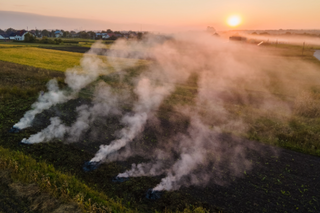Malaysia produces vast amounts of agricultural by-products such as rice husks, coconut shells, and palm kernel shells. Too often, these items end up being burned or discarded in landfills, contributing to pollution and greenhouse gas emissions. At INTI International University, researchers are proving that this material does not need to be wasted. With the right approach, it can be transformed into high-performance products that serve both industry and the environment.

Associate Professor Dr Ting Tin Tin from INTI’s Faculty of Engineering & Quantity Surveying contributed to a collaborative project that explores how agro-waste can be converted into nanoparticle additives for welding electrodes.
Associate Professor Dr Ting Tin Tin from INTI’s Faculty of Engineering & Quantity Surveying contributed to a project that explored how agro-waste can be converted into nanoparticle additives for welding electrodes. The study, conducted in Nigeria, demonstrated how locally available residues can be repurposed to enhance welding materials. For Malaysia, which faces similar challenges with agro-waste, the findings are especially relevant.
“By converting agricultural waste into nanoparticle additives, we are creating a greener solution while making welding electrodes more affordable and efficient,” said Dr Ting. “This is a sustainable step forward for both industry and society.”
The impact goes beyond waste reduction. Repurposing agricultural byproducts into welding electrodes represents a shift toward a circular economy, one where discarded materials gain new value. This change not only lessens environmental harm but also opens up opportunities for industries to lower costs while meeting sustainability goals.
The relevance becomes clearer when considering the role of welding itself. Though rarely in the public eye, welding is fundamental to daily life. Cars, railways, buildings, and bridges all depend on it. Electrodes, which conduct current and stabilise the welding arc, are essential to the process. By enhancing them with nanoparticles derived from agro-waste, researchers are improving durability, performance, and cost-effectiveness — practical benefits that directly strengthen the industries that rely on welding.

Malaysia generates millions of tonnes of agro-waste every year, much of which is still burned or left in landfills instead of being repurposed.
Equally important is how the project came together. Dr Ting worked with Dr Afolalu Sunday Abayomi of Covenant University, Nigeria, who is also a research fellow at INTI, along with other experts. Their collaboration drew on local agricultural knowledge in Nigeria and combined it with international expertise in materials science. It showed that sustainable practices can be adapted across borders, tailored to the resources and industrial needs of each country.
For Malaysia, the possibilities are clear. Just as Nigerian researchers tapped into their own agricultural residues, Malaysia could explore palm oil biomass, rice husks, and coconut shells for similar applications. With strong agricultural and manufacturing sectors, bridging these fields could reduce reliance on imports, make industrial products more affordable, and promote greener growth.
What makes this research especially compelling is the way it connects farming with engineering. A rice farmer in Kedah or a coconut grower in Sabah might never imagine that the remains of their harvest could strengthen machinery or infrastructure. Yet innovation is turning that possibility into reality.
Sustainability is not only about limiting harm. It is also about finding untapped potential in resources already around us. By contributing to this work, Dr Ting adds to the growing evidence that engineering can drive solutions for a more sustainable future in Malaysia, Nigeria, and beyond.